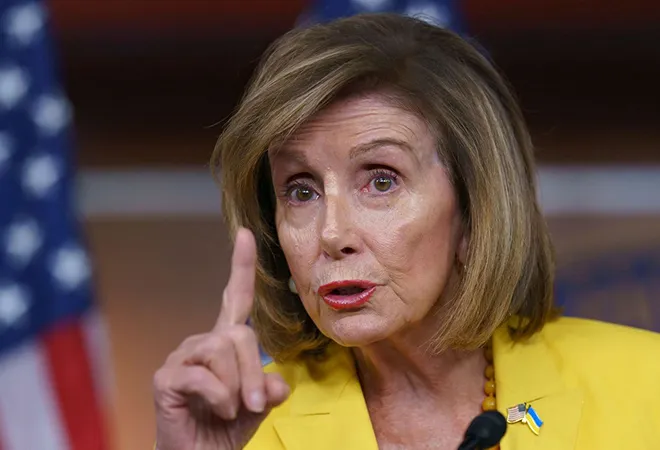-
CENTRES
Progammes & Centres
Location
China, keen to demonstrate that it is more powerful than Russia, has issued dire warnings to Washington against Pelosi’s visit

A potential visit by the United States House Speaker Nancy Pelosi to Taiwan is forcing Washington’s hand in a manner that makes President Joe Biden uncomfortable and the US military wary of China’s strident threats. The trip could precipitate a new crisis at a time when Washington is preoccupied with the war in Ukraine, trying to maintain European unity against Russia. China, keen to demonstrate it is more powerful than Russia, has issued dire warnings to Washington against Pelosi’s visit.
At the heart of the challenge is America’s “One China Policy” adopted in 1979, which recognised the government in Beijing as the legitimate Chinese government. Washington acknowledged Taiwan as a part of China but did not endorse Beijing’s sovereignty over the island. The same year, the US Congress passed the Taiwan Relations Act promising Taiwan arms of “a defensive character,” and said that any effort to integrate Taiwan by violent means would be seen as “a threat to peace and security of the Western Pacific Area and of grave concern to the United States.” This constituted what is called a policy of “strategic ambiguity,” leaving China to guess whether the US would actually defend Taiwan if the need arose.
Washington acknowledged Taiwan as a part of China but did not endorse Beijing’s sovereignty over the island.
Any visit by US officials to Taiwan elicits Chinese condemnation and a show of military strength by Beijing. But this particular trip by Pelosi to Taiwan, proposed for August, has worried Washington as few issues do, pitching supporters and opponents in a contentious debate. The arguments are reminiscent of old wrangles around China’s sensitivities and the need to accommodate them.
Those arguing against Pelosi’s visit tend to come from the same school of thought that has traditionally emphasised Chinese sensitivities over the US’ strategic compulsions. Members of this cottage industry, spawned by Henry Kissinger, overplay Beijing’s manufactured outrage and underplay America’s advantages. It is true that today, China is a different and more powerful country than in the decades gone by; its threats are backed by the military prowess and its leader is determined to press his advantage. But the question is whether Beijing should have a veto on the movement of senior US officials?
Biden and his top advisors have let it be known through media leaks that they are not in favour of Pelosi, a fellow Democrat, embarking on a Taiwan adventure. In their assessment, the trip is not worth the risk when the US is busy with the Ukraine war.
A visit to Taiwan would be a needless provocation and barely symbolic, which China would then use to its own benefit. Instead, the thought process of the administration is that Washington should send a real signal and strengthen Taiwan’s defences. The Biden administration’s not-so-private opposition to the visit has given China more ammunition to amplify its criticism. Foreign ministry spokesman Zhao Lijian, not known for understatement, warned of “strong measures” if Pelosi went ahead. “We are seriously prepared,” he said. “The US must assume full responsibility for any serious consequences arising thereof.”
The thought process of the administration is that Washington should send a real signal and strengthen Taiwan’s defences.
As China’s leader Xi Jinping gets busy plotting an unprecedented third term, he cannot afford to look weak. Chinese statements dripping with military threats are meant to raise the ante and provoke the kind of flustered response from Washington to which China has become accustomed over the years. To some extent, Beijing is succeeding because the White House has felt it necessary to dispel any notion that it supports Pelosi’s trip.
But the question remains whether Chinese statements are bluster or something more. Making an overt military manoeuvre against a top US official would arguably be riskier for China than for the US. If Biden does not want extras on his plate right now, Xi would want even less, given the economic slowdown at home and the need to quell a thousand mutinies before the 20th Party Congress.
Xi is faced with rising unemployment, a deepening real estate crisis with Chinese homeowners refusing to make mortgage payments, and the myriad second and third-order effects of a zero-Covid policy. At the same time, if Pelosi—the third highest ranking official in the US hierarchy after the President and Vice President—abandoned the trip to Taiwan because of Chinese bullying, it would send the wrong signal to Asian allies and bolster those who doubt the US commitment to the region.
China’s protestations aside, Pelosi’s trip is not the first by a House speaker. Newt Gingrich, a Republican, went to Taipei in March 1997 while he was Speaker of the House after he visited Beijing, where he bluntly told Chinese officials, including former President Jiang Zemin, that the US would defend Taiwan if it were attacked.
Xi is faced with rising unemployment, a deepening real estate crisis with Chinese homeowners refusing to make mortgage payments, and the myriad second and third-order effects of a zero-Covid policy.
Gingrich has thrown his support behind Pelosi and questioned the US military’s opposition. “What is the Pentagon thinking when it publicly warns against Speaker Pelosi going to Taiwan. If we are so intimidated by the Chinese Communists we can’t even protect an American Speaker of the House why should Beijing believe we can help Taiwan survive. Timidity is dangerous,” he said on Twitter. Other Republicans, including former Secretary of State Mike Pompeo, are also urging Pelosi to go ahead. Pompeo even offered to accompany her. “Nancy, I’ll go with you. I’m banned in China but not in freedom-loving Taiwan. See you there,” he said on Twitter.
Whether Pelosi ends up going to Taiwan or not, the space for US policy of strategic ambiguity is shrinking according to the Central Intelligence Agency’s (CIA) own assessment of China’s future moves. William Burns, director of the CIA, told the Aspen Security Forum recently that Xi was determined to take control of Taiwan but was studying the Russian military’s shortfalls in Ukraine. “I think the risks of (an invasion) become higher, it seems to us, the further into this decade you get,” Burns said. After Ukraine, the Chinese leadership thinks a successful attack against Taiwan will require overwhelming force; Beijing has been “unsettled” by the beating the Russian military has taken in the ongoing war. As Xi prepares for his move, so must Washington if Taiwan’s quest to remain free means something to the US leaders.
The views expressed above belong to the author(s). ORF research and analyses now available on Telegram! Click here to access our curated content — blogs, longforms and interviews.

Seema Sirohi is a columnist based in Washington DC. She writes on US foreign policy in relation to South Asia. Seema has worked with several ...
Read More +